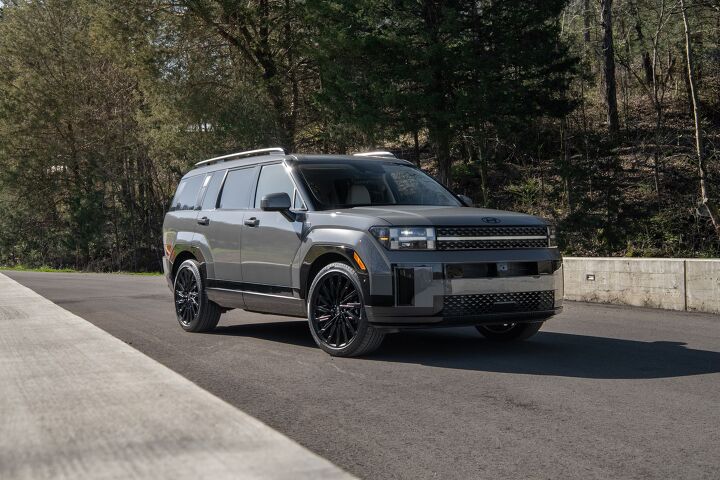Hyundai Motor Plans On Building More Hybrids Inside North America

Hyundai Motor reportedly plans on using preexisting investments slated for its new EV facility in Georgia to pivot toward hybrid vehicles, as all-electric models haven’t seen the kind of adoption rates that would warrant an entire factory — let alone the plant that will become its largest outside of South Korea.
This is despite over a decade of government subsidies trying to push the world toward battery powered transportation, much of which went directly to automakers as a way to help them cope with high development costs of novel electric powertrains. However, selling something few are buying isn’t a great business model — even if Western governments still plan on instituting emissions fines to punish automakers that don’t manage to comply.
News that Hyundai was considering shifting at least some of the production at its new EV facility in Georgia has been swirling since March.
Chief Operating Officer Jose Munoz made the announcement on Wednesday during a conference hosted by the Financial Times.
"I think we can handle [everything] within the current investment more or less,” he said.
From Reuters:
South Korea's Hyundai Motor Group, which houses Hyundai Motor and Kia, said it would invest $12.6 billion for new dedicated EV and battery manufacturing facilities in Georgia — its largest investment outside South Korea.
Munoz's comments come after the automaker said last month it planned to add equipment to build hybrid vehicles at the Georgia plant, which is set to start production in the second half of this year.
"Now we are at this pivotal point where we can decide if we're going to go full electric or if we should go for something else. My vote here is that we should go for something else in addition to electric," said Munoz, when asked about Hyundai's decision to add hybrids to the plant.
The most interesting aspect of this is that the state had roughly $2 billion in government incentives put in place to encourage Hyundai to build a factory within its borders. These kinds of deals are relatively common, with state and local governments simply trying to tempt companies to set up shop with the assumption that the subsequent investments will strengthen communities and gradually result in improved tax revenues. In fact, Georgia’s own investments were tied to how much Hyundai was willing to spend and managed to push the build from a $7.6-billion affair to one that’ll cost well over $12 billion to complete.
However, much of the relevant tax breaks and supplemental funding were tied to this being a production facility focused on all-electric vehicles. That's how the deal was sold, anyway. Building hybrids would seem to undermine the original terms slightly. But with the term "electric vehicle" being rather nebulous, hybrid vehicles (even if they aren’t of the plug-in variety) sometimes qualify. What Georgia is getting doesn’t appear to be exactly what it asked for. But the region undoubtedly still wants to see new assembly lines put into place to help bolster job growth and the local economy.
Munoz was quoted by Reuters as saying Hyundai Motor was preparing itself for "different scenarios", in regard to the U.S. Inflation Reduction Act that requires electric vehicles to be assembled inside North America to qualify for EV tax credits. This has also been pretty normal within the industry, with the assumption being that another Trump administration would basically see the aggressive electrification policies done away with. That would presumably include financial subsidies for automakers, leading to many taking a wait-and-see approach.
[Image: Hyundai]
Become a TTAC insider. Get the latest news, features, TTAC takes, and everything else that gets to the truth about cars first by subscribing to our newsletter.

Consumer advocate tracking industry trends and regulations. Before joining TTAC, Matt spent a decade working for marketing and research firms based in NYC. Clients included several of the world’s largest automakers, global tire brands, and aftermarket part suppliers. Dissatisfied, he pivoted to writing about cars. Since then, he has become an ardent supporter of the right-to-repair movement, been interviewed about the automotive sector by national broadcasts, participated in a few amateur rallying events, and driven more rental cars than anyone ever should. Handy with a wrench, Matt grew up surrounded by Detroit auto workers and learned to drive by twelve. A contrarian, Matt claims to prefer understeer and motorcycles.
More by Matt Posky
Latest Car Reviews
Read moreLatest Product Reviews
Read moreRecent Comments
- Ajla IMO, something like this really should be naturally-aspirated.
- Kjhkjlhkjhkljh kljhjkhjklhkjh Unless they are solid state batteries you BAN THEM. I like EVs... but EVs like to burn ... for days
- Kjhkjlhkjhkljh kljhjkhjklhkjh uh .. it looks like a VW golf got the mumps
- Kjhkjlhkjhkljh kljhjkhjklhkjh I CANNOT WAIT FOR SOCIAL SECURITY TO GET GUTTED.. No i am really serious. I am insulated thanks to 24 years at Symantec then Broadcom .. tons of retirement cash. but all the blue hairs and low income trump voters are going to lose benefits and jobs and i get to laugh allllll dayyyyy long in about 2-3 years.. CANNOT WAIT, POPCORN READY.
- Kjhkjlhkjhkljh kljhjkhjklhkjh no. to many '''''americans'''' just want a CUV or SUV according to sales numbers



































Comments
Join the conversation
"...to help bolster job growth and the local economy"
An easy win for the politicians - the details won't matter.
While Hyundai has enough models that offer a hybrid variant, problem has been inadequate supply, so this should help address that.
In particular, US production of PHEVs will make them eligible for the tax credit.